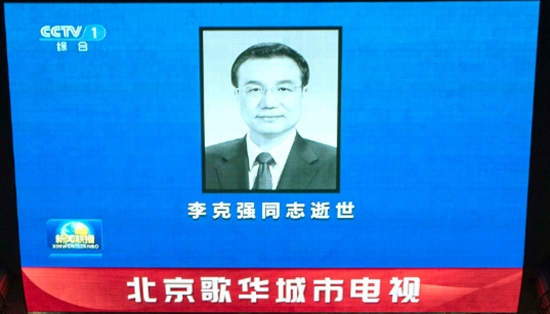
In China, it may be forbidden to express condolences for a fallen leader in any but a carefully prescribed way.
Was former Premier Li Keqiang, removed from power in March 2023, just months before he died on October 27, 2023 at age 68, really such a beloved figure in China?
Associated Press reports that in 2013 Li had been a contender for the top spot in the Chinese Communist Party but had been passed over in favor of Xi Jinping, whose rapid centralization of power in his own person would leave “Li and others in the seven-member Standing Committee with little influence.”
As the top economic official, Li promised to improve conditions for entrepreneurs who generate jobs and wealth. But the ruling party under Xi increased the dominance of state industry and tightened control over tech and other industries. Foreign companies said they felt unwelcome after Xi and other leaders called for economic self-reliance, expanded an anti-spying law and raided offices of consulting firms.
Li was dropped from the Standing Committee at a party congress in October 2022 and left office in March 2023, despite being two years below the informal retirement age of 70.
Li had been in charge of at least one thing (whether just nominally or in fact is hard to know): China’s response to the COVID-19 pandemic. Only toward the end of his tenure, in November 2022, as protests against Draconian pandemic measures were spreading across China, did he announce that the controls would be relaxed. Even so, in Radio Free Asia’s account, mourners declared that Li was “The people’s premier” and “A good premier whose political career shouldn’t have ended the way it did.”
Chinese people took to social media with candle emojis and condolences to mourn the death of former premier Li Keqiang on Friday—until censors stepped in to ensure that only uniform and formulaic condolences remained for the 68-year-old technocrat, who died of a heart attack in the early hours of Friday morning in Shanghai.
After Li died, universities warned students to watch what they post and to avoid talking to media. University staff were told to keep track of students’ thoughts, opinions, and gatherings.
The censorship and nervous alert status are largely a response to memories of 1989 and 1977.
In April 1989, thousands flocked onto Tiananmen Square in a mass public outpouring of grief over the sudden death of widely loved premier Hu Yaobang. Those gatherings developed into a weeks-long mass pro-democracy movement ending in a massacre of civilians by the People’s Liberation Army.
According to late Communist Party official Bao Tong, who was in government at the time: “The whole nation was plunged into grief. In a commemoration that took its cue from that for [former premier] Zhou Enlai, the students began making their way to Tiananmen Square in silence.”
“In 1977, people were ostensibly mourning for Zhou, but in fact were turning out against Mao. In 1989, they were ostensibly mourning for Hu, but things were even more complicated. Not only was Hu a former General Secretary who had presided over the throwing out of thousands of trumped up criminal cases, but he was also a politician who was kicked out for falling foul of [late supreme leader] Deng [Xiaoping].”
In the same way, much of the public outpouring of grief for Li Keqiang may be more an expression of disapproval of Xi than approval of Li.





